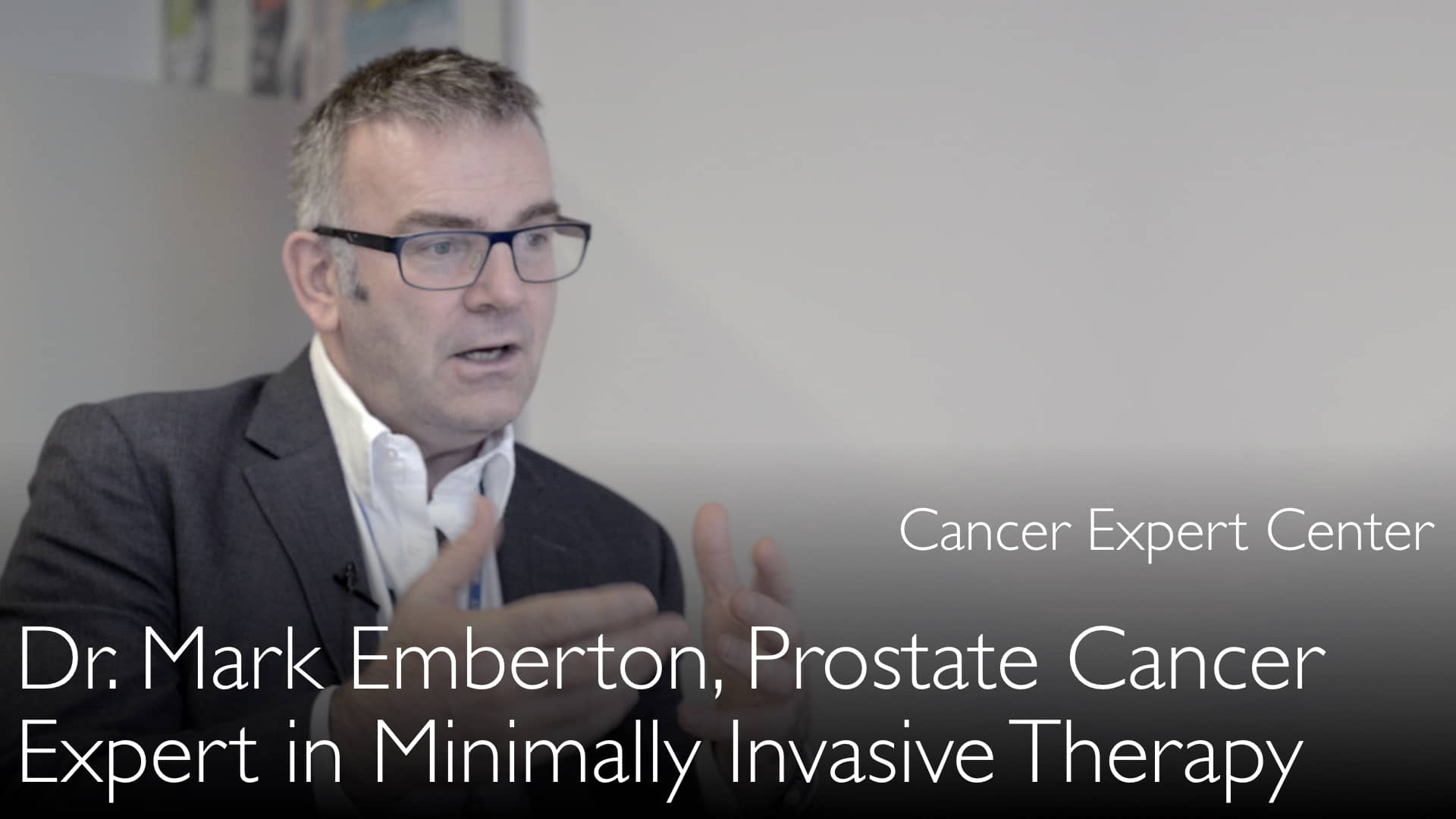Leading expert in prostate cancer diagnosis and treatment, Dr. Mark Emberton, MD, explains how the prostate-specific antigen (PSA) test is a powerful prognostic marker when used correctly. He clarifies that the controversy surrounding PSA stems from subsequent actions like imprecise biopsies, not the test itself. Dr. Emberton details how modern MRI technology, particularly non-contrast scans, can revolutionize prostate cancer screening by working in conjunction with PSA to improve diagnostic accuracy and potentially serve as a cost-effective, one-time screening tool.
Optimizing Prostate Cancer Screening: The Evolving Role of PSA and MRI
Jump To Section
- PSA Controversy and Historical Misuse
- PSA as a Powerful Prognostic Marker
- MRI Revolutionizing Prostate Cancer Diagnosis
- The Potential of Non-Contrast MRI Screening
- The Future of Prostate Cancer Screening
- Integrating PSA, MRI, and Active Surveillance
PSA Controversy and Historical Misuse
Prostate-specific antigen (PSA) testing for prostate cancer remains a subject of intense debate among clinicians and patients. Dr. Mark Emberton, MD, offers a clarifying perspective, stating that the problem has never been with the PSA test itself. The core issue lies in the clinical actions taken after an elevated PSA result is identified. Historically, the standard response was to proceed directly to a transrectal ultrasound (TRUS) biopsy, a procedure Dr. Emberton describes as "riddled with imprecision." This approach often led to overdiagnosis and overtreatment of low-risk cancers, fueling the ongoing controversy and frequent changes in clinical guidelines.
PSA as a Powerful Prognostic Marker
When separated from immediate biopsy, PSA reveals its true value as a powerful predictor of long-term survival. Dr. Mark Emberton, MD, cites long-term Swedish cohort studies where archived blood samples were analyzed. The data from these matured cohorts, where all participants had died, provided profound insights. The research demonstrated that a PSA level below 1 ng/mL is associated with an "infinitesimally small" chance of dying from prostate cancer. Conversely, Dr. Mark Emberton, MD, notes that a PSA level around 2 ng/mL in a younger man can signal a potential future problem, establishing PSA's critical role as a prognostic marker for identifying men at risk.
MRI Revolutionizing Prostate Cancer Diagnosis
The advent of multiparametric MRI has dramatically changed the prostate cancer diagnostic pathway, effectively rehabilitating the utility of the PSA test. Dr. Mark Emberton, MD, explains that MRI addresses two major limitations of PSA interpretation. First, MRI accurately measures prostate volume, which is a key physiological driver of PSA levels, helping to contextualize a result. Second, and most importantly, MRI allows clinicians to visually identify the presence of clinically significant cancer within the gland itself. This imaging capability enables a subsequent targeted biopsy, which is far more precise than the traditional random sampling method. This combination allows PSA to perform much better because the verification test that follows is now highly accurate.
The Potential of Non-Contrast MRI Screening
Looking to the future, Dr. Mark Emberton, MD, proposes a radical shift in screening paradigms using non-contrast MRI. He describes a protocol requiring only T2-weighted anatomical sequences and diffusion-weighted imaging (DWI), a process that can be completed in 10 to 15 minutes without intravenous contrast. This "completely passive test" requires no physician presence, suggesting it could be performed in accessible, low-cost settings. Dr. Emberton draws a parallel to colorectal cancer screening, envisioning a one-time prostate MRI around age 55 to stratify lifetime risk, a concept his team is actively seeking to research through grant funding.
The Future of Prostate Cancer Screening
The potential for a new, MRI-based screening model represents a significant evolution in men's health. Dr. Mark Emberton, MD, acknowledges that while this idea is currently controversial and research proposals have faced rejection, he believes it will inevitably be tested. The goal is to develop a highly cost-effective strategy that identifies the men most at risk of aggressive disease while minimizing unnecessary procedures for those at low risk. This approach could fundamentally change how we think about early detection, moving away from annual blood tests towards a more definitive anatomical assessment at a key age.
Integrating PSA, MRI, and Active Surveillance
The optimal modern strategy for prostate cancer involves a synergistic combination of tools. Dr. Anton Titov, MD, summarizes the discussion by concluding that PSA, in conjunction with MRI and active surveillance, represents the best use of the biomarker. Dr. Mark Emberton, MD, agrees wholeheartedly. This integrated approach uses PSA as an initial, cheap risk-stratification tool. Men with elevated or concerning PSA levels can then undergo MRI to visually confirm the need for a biopsy. If a low-risk cancer is found, active surveillance—monitoring with periodic PSA tests and MRIs—becomes a safe and effective management option, preventing overtreatment. This holistic method maximizes the strengths of each technology while mitigating their individual weaknesses.
Full Transcript
Dr. Anton Titov, MD: How to use PSA correctly for prostate cancer screening? High PSA levels are different in young and older people. Prostate MRI without contrast to screen for prostate cancer.
Dr. Anton Titov, MD: PSA is controversial in prostate cancer diagnosis. Guidelines seem to change just about every year. How can PSA be used in the general population, in high-risk populations, or in surveillance for prostate cancer diagnosis? What is your personal point of view on PSA use in prostate cancer?
Dr. Mark Emberton, MD: We all blame PSA in prostate cancer diagnosis. The problem isn't with PSA. The problem is with what we did after PSA.
Dr. Mark Emberton, MD: PSA, as long as you don't do a biopsy, is a fantastically powerful predictor of survival in prostate cancer. We know this from the Swedish studies that we've done. These were cardiological studies done 40 to 50 years ago, and blood was preserved.
Dr. Mark Emberton, MD: From blood samples, we've been able to ascertain PSA levels. Those "cohorts matured," meaning that all people in the clinical study died. We know what they died of.
Dr. Mark Emberton, MD: If your PSA is less than 1, your chances of dying of prostate cancer are infinitesimally small. So low PSA is good. And what it also told us is this: if you are young and have a PSA that is around 2, you might also have a problem.
Dr. Mark Emberton, MD: PSA is a prognostic marker of what might happen in the future. It is hugely valuable.
Dr. Anton Titov, MD: Once you start doing a test like transrectal biopsy, which is riddled with imprecision, the role of PSA diminishes.
Dr. Mark Emberton, MD: Change that to today. MRI allows you to adjust for prostate volume, which is a key driver of PSA. Prostate MRI also allows you to see whether there's a cancer or not within the prostate. MRI allows you to do an accurate prostate biopsy.
Dr. Mark Emberton, MD: PSA might work much better because of the performance test. PSA works better with the verification that you're doing afterwards. So I think we have to look at PSA again.
Dr. Mark Emberton, MD: The function of PSA is being determined by what we do after it. We've just discussed that MRI has changed dramatically. It may be now that PSA is a useful early cheap test to identify a cohort of men that can subsequently be diagnosed with prostate cancer.
Dr. Mark Emberton, MD: One caveat is this: if you do enough MRIs on enough people, you soon find men who have quite large prostate cancers with very low PSAs. While it will certainly improve the performance of PSA, PSA might not be the perfect test.
Dr. Mark Emberton, MD: PSA has sensitivity. It can identify the real cancers that are out there and miss very few. It may be that MRI without the injection can be done easily to screen for prostate cancer. This is controversial.
Dr. Mark Emberton, MD: MRI without contrast is a completely passive test. You only have to do "T2 sequences," which are the anatomical sequences, and you do diffusion sequences, which can be done in about 10 to 15 minutes. It is MRI without IV contrast because it's a completely passive test.
Dr. Mark Emberton, MD: No IV contrast, no doctor present during such MRI. You could have your MRI in the supermarket. You don't need a physician present. It might be a very cost-effective test done once in a lifetime.
Dr. Mark Emberton, MD: In the way that we do a flexible sigmoidoscopy or colonoscopy now around 55 years of age, this predicts whether or not you are likely to get colon cancer and to die of colorectal cancer. So this is something we wish to explore.
Dr. Mark Emberton, MD: We've put in a couple of grant applications on this very topic of using MRI to screen for prostate cancer. They've all been rejected, but I think with time it will be tested.
Dr. Anton Titov, MD: So PSA, in conjunction with MRI, and in conjunction with active surveillance and clinical opinion, might be the best use of PSA.
Dr. Mark Emberton, MD: I think so, yes.





